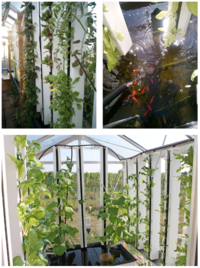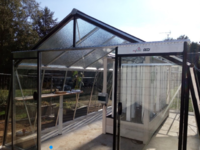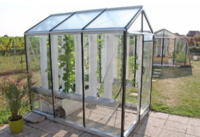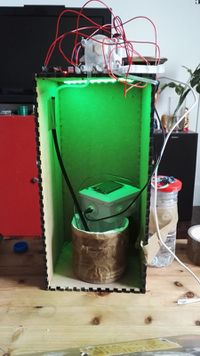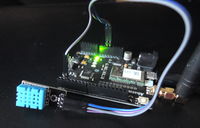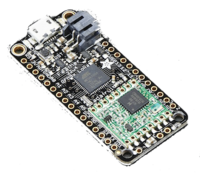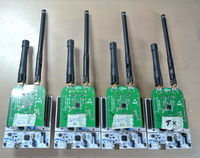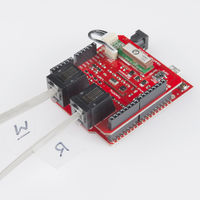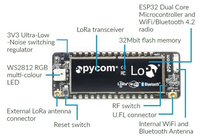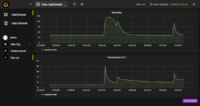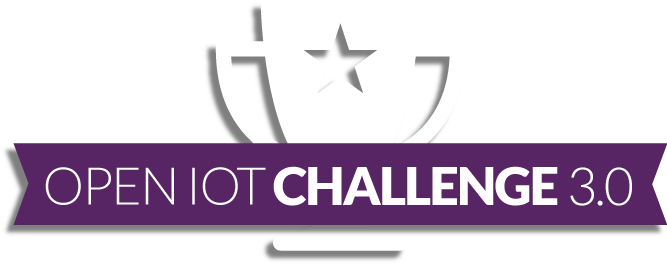Difference between revisions of "I-Greenhouse"
(→Goal) |
|||
| Line 146: | Line 146: | ||
* Student defense |
* Student defense |
||
| + | = Progress = |
||
| + | |||
| + | [[I-Greenhouse progress]] |
||
=References= |
=References= |
||
Revision as of 15:39, 11 January 2017
Goal
Monitor real-life greenhouses for organic and auto-production agriculture with LoRaWAN and SigFox endpoints.
Source repository
https://github.com/igreenhouse
Contact
Nicolas PALIX, Didier DONSEZ, Polytech Grenoble, Université Grenoble Alpes.
Follow us on Twitter (#I-Greenhouse)
Greenhouse
This project is a student project at Polytech Grenoble about solar-powered greenhouse. Polytech Grenoble is an engineering school teaching computer science, embedded systems and electronics among other disciplines. The urban agriculture aims to answer future challenges: reduction of the cultivated area, green economy, carbon footprint for transport of goods, self-production towards alimentary self-sufficiency of cities. This production mean takes into account the constraints of the cities, where the surfaces are limited and expensive, by using vertical farming. An aquaponic system with fishes will provide nutriments for the plants. Finally, to irrigate the plants with the water from the fish tank, an irrigation system will be used. It will be powered by solar-energy with a battery pack.
Urban agriculture around the world
Similar experiments are performed abroad : New-York[1], Montréal[2]. In France, large cities are also interested as Paris[3] or Lyon[4], with the support of universities, or local public administration. In the Grenoble area, a civil group « Cultivons nos toits »[5] experiments on top of a fablab building.
We are interested in several measurements useful for the greenhouses:
- Solar energy production and energy stored in the batteries,
- Oxygenation, pH, and oxidation-reduction potential of the fish tank water,
- Temperature of the fish tank water,
- Temperature of the air, both inside and outside of the greenhouse,
- Humidity of the air, both inside and outside of the greenhouse,
- Intrusion detection and presence.
- NFC identification
These measurements will be helpful to monitor the greenhouse, and will be used to take control decisions on:
- Triggering alarms to feed the fishes
- Feeding the plants and possibly adding nutriments
- Switch the ventilation to control humidity and temperature
Long-range communication technologies on ISM bands
LoRa and SigFox are the two leading communication technologies for Low Power Wide Area Networks (LPWAN) on free-licensed ISM bands (433MHz and 868MHz in Europe, 915 MHz in US/CA/MX, ...). LoRa and Sigfox enable communication over several kilometers (Line of Sight and Non Line of Sight) with low-power consumptions and long battery lifetime (several years with 2 AAA batteries). Therefore, the typical network topology is the star topology : all endpoints transmit data to (resp. receive data from) one or several gateways. Ten gateways are enough to cover a city of 1 million inhabitants. Moreover, LoRa can leverage private networks. LoRa gateways manage up to 49 LoRA channels and cost 500 - 1000 € /per unit. However, LoRa allows to build DIY Pico-gateways with ESP8266 or RPi-0 for instance starting at 40 € (including antenna and enclosure). Pico-gateways manage only one channel, but that's would be enough for a small private LPWAN.
Goal of the project
The goal of the project is to design LoRaWAN and SigFox endpoints and pico-gateways for monitoring real-life greenhouses for organic and auto-production agriculture.
The four deliverables are:
- The design of LoRa and SigFox endpoints (HW/SW),
- The design of a LoRa pico-gateway (HW/SW) based on SX1272 or SX1308 (if available on time),
- The design of a monitoring back-end with alarms,
- The design of data visualization UI and mobile applications.
These deliverables will designed by the Polytech Grenoble students in computer science, embedded systems, and electronics.
These designs will be released as open-source software, open-hardware, and open-design into the Eclipse IoT community.
Hardware
The open-source hardware involved in this project are:
- for LoRa endpoints
- ST Nucleo L152RE + Semtech SX1272 Shield (Link)
- Adafruit Feather 32u4 RFM95 LoRa Radio 868 MHz
- for Sigfox endpoints:
- ST Nucleo L152RE + Snootlab Akene Shield (Link)
- for endpoint sensors (Groved or not):
- BMP180 (temperature, humidity and pressure)
- DHT11 (temperature, humidity)
- Soil humidity sensor
- pH sensor
- Battery level sensor
- Luminosity sensor
- Sparkfun’s weather shield (DEV-12081) and sensors (SEN-08942)
- PIR for presence detection
- Adafruit’s NFC shield (Link)
- for LoRa pico-gateways
- PyCom LoPy board (Wifi, BLE and LoRa connectivity). (Link)
- ESP8266 (Wifi) + Microchip RN2483 LoRa module + Tindie’s RN2483 PCB
- RPIx (x=[0..3]) + Microchip RN2483 LoRa module + Tindie’s RN2483 PCB
- RPIx (x=[0..3]) + Semtech SX1308 reference design USB board
Software
The open-source software involved in this project are:
- for endpoints
- LoraNet/Loranode (MBed lib)
- for pico-gateways
- PyCom Lora Lib
- RPI Lora RN2483 Lib
- ESP8266 Arduino Lib
- for back-end
- Collect: Paho, Mosquitto, Vorto, Ponte, Node-RED
- Time-Series Storage: InfluxDB
- Data Vizualisation : Grafana, OpenHAB/Eclipse SmartHome
- Mobile applications: Cordova
- Event-Condition-Action Rule Engine: Kapacitor, OpenHAB/Eclipse SmartHome
- for SMS Provider:
- Free Mobile (Link) : free for subscribers
Schedule of the project
March-November 2016
- 1st HW/SW software and hardware design of the LoRa endpoint for temperature, humidity, rain and wind (Figure 2)
- 1st HW/SW software and hardware design of the Sigfox endpoint for temperature and humidity (Figure 3)
- 1st HW/SW design of the LoRa pico-gateway based on ESP8266 + RN2483 (Figure 4)
- 1st mockup of the backend based on MQTT, Node-RED and InfluxDB Link (Figure 5)
- 1st mockup of the data-visualization application based on Grafana Link (Figure 5)
December 2016
- Order of Adafruit Feather 32u4 RFM95 LoRa Radio on Adafruit with the USD 150 gift.
January 2017 (start of the student project)
- Ordering of the 14 square meters greenhouse and associated material
- Installation of the greenhouse in Polytech Grenoble backyard
- Sigfox endpoints (with first set of sensors)
February 2017
- Lora backend and LoRa endpoints (with first set of sensors)
- Lora pico-gateway hardware
- Grafana dashboard
March 2017
- March 9-10: Participation to the Eclipse IoT Days 2017 Grenoble (lik)
- Lora pico-gateway software
- LoRa endpoints (with second set of sensors)
- Sigfox endpoints (with second set of sensors)
- Alarming backend (Email, Free SMS, Android push).
April 2017
- Cordova mobile application
- Integration in OpenHAB/Eclipse SmartHome
- User documentation
- Student defense
Progress
References
- http://myfood.eu/
- http://www.ted.com/talks/britta_riley_a_garden_in_my_apartment
- https://lufa.com/
- http://agricultureurbaine-idf.fr/
- http://lepassejardins.fr
- http://www.cap-berriat.com/les-assos-de-la-pep/listing/cultivons-nos-toits
- Developing IoT Mashups with Docker, MQTT, Node-RED, InfluxDB, Grafana
- Projets IoT 2016
- Weather Station Wirelessly Connected to Wunderground Link
- Open IoT Challenge 3.0 scholars
Note
Université Grenoble Alpes (UGA) is member of the Eclipse Foundation since 3 years.
